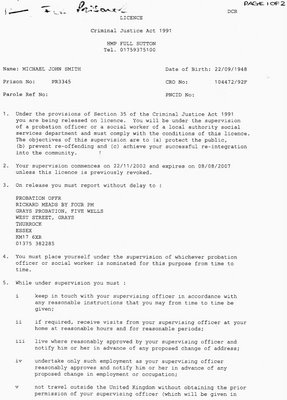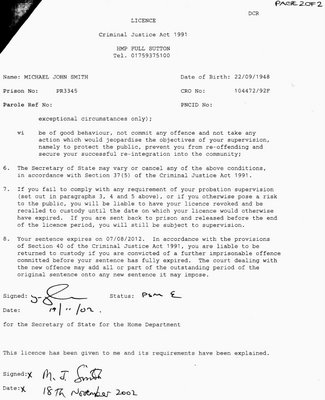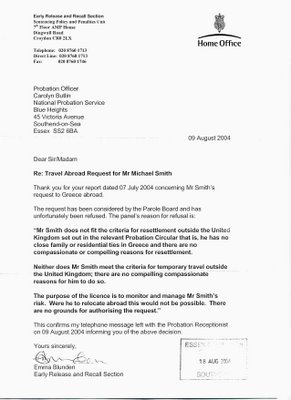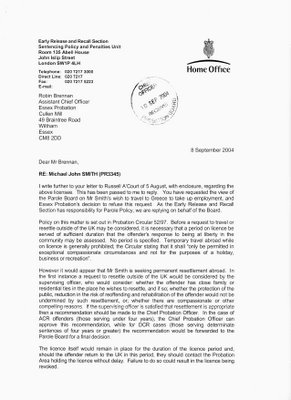Are all so-called conspiracies just co-incidences, I wonder? It would make life simpler if they were. For example, who decided that the judge at my trial should be Justice John Blofeld? This co-incidence becomes even more bizarre when we learn that Ian Fleming used the name Blofeld as his super villain in the James Bond spy books, because Fleming went to school with Justice Blofeld’s father. What did Ian Fleming know about the Blofeld family that caused him to conjure up a vision of villainy in association with that name? Could this be some sort of sick joke by the Criminal Prosecution Service, or was Justice Blofeld really the best man for the job? Enough of this line of thought - these coincidences do not amount to a conspiracy, and I shouldn’t put such ideas into your mind.
One of the first things a person (the offender) must do, when released on parole from prison, is to attend their local probation office. The conditions of my parole licence were that I must attend their office between November 2002 and August 2007- a few mere months I hear you say - and in signing the licence I was accepting certain rules. I will not go into all the details, as they are rather mundane, but below are some of the points I found rather important, which will give you a flavour of the restrictions imposed:
1. … You will be under the supervision of a probation officer … and must comply with the conditions of this licence. The objectives of this supervision are to (a) protect the public, (b) prevent re-offending and (c) achieve your successful re-integration into the community.
5. While under supervision you must:
iv undertake only such employment as your supervising officer reasonably approves and notify him or her in advance of any proposed change in employment or occupation
v not travel outside the United Kingdom without obtaining the prior permission of your supervising officer (which will be given in exceptional circumstances only).
vi be of good behaviour, not commit any offence and not take any action which would jeopardise the objectives of your supervision, namely to protect the public, prevent you from re-offending and secure your successful re-integration into the community.
Well, in accordance with the spirit of the licence, I did tell my probation officer on 10 January 2006 that I was considering starting a blog about my case, so they can’t say I didn’t warn them.

Parole Licence page 1
Parole Licence page 2
I faced several problems after release from prison, principally finding a job, because that is a necessary prerequisite to get me back into society and on with my life. I expected to encounter some difficulties, but then I had some positive qualities to offer: for example I have 2 university degrees, over 21 years of useful experience in industry, and I was armed with skills that I believe are in demand in the workplace.
Unfortunately, my optimism that a job would soon be offered to me was a little premature. In the past 3 years I have applied for well over a thousand vacancies, but no organisation seems willing to employ me in my chosen field of quality assurance. It is a little disconcerting to see jobs advertised, in which I know I could easily perform well, but be turned down by one line emails telling me I am not suitable. An issue that often comes up is that I have not worked for so long - well, how could I?
When I was first moved to Full Sutton prison I asked if I could do some quality assurance work with local companies, but this was turned down because of “security” issues. Obviously security was more important than helping me to secure my future, and it is easy to see how first time offenders might quickly turn into career criminals, when there is no chance to get a job. I believe the prison system has effectively made me unemployable, by preventing me doing any work that would convince an employer I still have the skills I possessed before I was arrested.
Shortly after I was released I met my probation officer, and he told me the Home Office had contacted him and told him to keep a very close eye on me. Apparently the Home Office was worried about what I might do - visit the Russian Embassy maybe? Why the probation officer should disclose that information to me I have no idea - perhaps it was such an unusual incident that it surprised him - but I am sure the Home Office did not intend me to find out what they were thinking. Possibly, this Home Office instruction appeared inconsistent in the probation officer’s mind, with that other detail he knew: that I was considered a “low risk” - it was assessed there was little danger I would “re-offend”.
I quickly learned that the Probation Service could not help me re-integrate into society, and they certainly would not help me find a job. In fact, I was amazed they had no apparent plan about how to deal with me, or what we were meant to discuss, and it was often left to me to set an agenda. I was given no targets, and so how could they assess my achievements? Various probation officers have told me their main function is “surveillance” - they are there to watch me, to ensure I don’t go off the rails - so Probation is not there to help me but to observe and control me. With my background in quality assurance, this situation astounded me, and I couldn’t believe how ineffective and unprofessional this probation system really is; it amounted to a waste of public money, and my time it seemed.
Things started to turn nasty when I was offered a job abroad, in Greece, at the end of 2003. I thought this was an ideal opportunity to make some money, buy a property abroad, and get my life back into order. If I had been allowed to go abroad I would have just got on with my life, and possibly not even bothered to continue challenging the basis of my conviction. However, as I stated above, one of the rules was not to leave the UK. This issue caused an enormous rift between me and the probation officers; they wanted me to remain in the UK, a country that had apparently rejected me, and I would have to remain unemployed and live off taxpayer funded benefits.
I took what action I could through the appeal procedures and got nowhere. As so often happens, the official replies of the ministry automatons began to appear:
From: Emma Blunden
Early Release and Recall Section
Home Office
09 August 2004
To: Carolyn Butlin
Probation Officer
Essex Probation
Dear Sir/Madam,
Re: Travel Abroad Request for Mr Michael Smith
Thank you for your report dated 07 July 2004 concerning Mr Smith’s request to travel to Greece.
The request has been considered by the Parole Board and has unfortunately been refused. The panel’s reason for refusal is:
“Mr Smith does not fit the criteria for resettlement outside the United Kingdom set out in the relevant Probation Circular that is, he has no close family or residential ties in Greece and there are no compassionate or compelling reasons for resettlement.
Neither does Mr Smith meet the criteria for temporary travel outside the United Kingdom; there are no compelling compassionate reasons for him to do so.
The purpose of the licence is to monitor and manage Mr Smith’s risk. Were he to relocate abroad this would not be possible. There are no grounds for authorising the request.”
Yours sincerely,
Emma Blunden
Emma Blunden Letter
Another letter copied to me was this one:
From: Simon Holmes
Early Release and Recall Section
Home Office
8 September 2004
To: Robin Brennan
Assistant Chief Officer
Essex Probation
Dear Mr Brennan
Re: Michael John Smith
You have requested the view of the Parole Board on Mr Smith’s wish to travel to Greece to take up employment, and Essex Probation’s decision to refuse this request.
Policy on this matter is set out in Probation Circular 52/97. Before a request to travel or resettle outside of the UK may be considered, it is necessary that a period on licence be served of sufficient duration that the offender’s response to being at liberty in the community may be assessed. No period is specified. Temporary travel abroad while on licence is generally prohibited; the Circular stating that it shall “only be permitted in exceptional compassionate circumstances and not for the purposes of a holiday, business or recreation”.
However, it would appear that Mr Smith is seeking permanent resettlement abroad. In the first instance a request to resettle outside of the UK would be considered by the supervising officer, who would consider: whether the offender has close family or residential ties in the place he wishes to resettle, and is so; whether the protection of the public, reduction in the risk of re-offending and rehabilitation of the offender would not be undermined by such resettlement, or; whether there are compassionate or other compelling reasons. If the supervising officer is satisfied that resettlement is appropriate then a recommendation should be made to the Chief Probation Officer.
The licence itself would remain in place for the duration of the licence period and, should the offender return to the UK in this period, they should contact the Probation Area holding the licence without delay. Failure to do so could result in the licence being revoked.
Turning to Mr Smith’s case, it does not appear that he meets the criteria for resettlement abroad to be appropriate. He does not have close family or residential ties in Greece, and there are no exceptional or compassionate circumstances beyond his difficulties in securing employment. Therefore I would support the view that his request should not be granted.
Yours sincerely,
Simon Holmes
As I said earlier, I was told I am a “low risk”, and there are muggers and other dangerous offenders on probation who have much shorter periods of licence than me, but who I would suggest pose a far greater risk to the public. When I have challenged probation officers to tell me what risk I do actually pose, it is odd that they cannot tell me. Which leaves me puzzling that, if they cannot quantify the risk factors, how on earth can they monitor to check if I am meeting their criteria? Obviously the monitoring comes first, regardless of what they are monitoring, and even if it prevents me getting a job and re-integrating back into the community.
Then I began to compare my treatment to that of other prisoners I had known at Full Sutton prison; men who came from the Czech Republic, Holland and Portugal. The foreign nationals in UK prisons are usually deported at the half-way point in their sentences, without the need for a parole licence. The 3 people I am thinking of all returned to their home countries after release, and they all went home with no licence or probation conditions to comply with. These foreign nationals can come and go as they please, visit any country they choose, and the Portuguese man has even returned to the UK and walked the streets of Britain without the need for a licence. I remember the time when even dogs needed a licence to walk down a British street.
This contradictory state of affairs demonstrates, yet again, that good old British custom of double standards, but then Britain appears to be the home of the double standard. Whatever way you look at it, it would seem I am being persecuted because I am British. It might be hard to comprehend this, but the facts are plain to see: I am being treated differently because I am British and living in Britain.
In these days when the nations comprising the European Union are striving to bring their disparate laws and systems into some more common standard, and to set a fair constitution for human rights, my human rights are apparently less than if I were Czech, Dutch, or Portuguese. It is a funny old world when, because I am British, I have to suffer more severe restrictions than if I were a citizen of another EU country.
As I am unemployed I have to attend the local Job Centre (who can’t find me a suitable job), and they suggested I should consider going after jobs like warehouse work, presumably because I am physically fit enough to lift and carry boxes around, and place them on shelves. Well, as an intellectual, I would find it difficult to accept the challenges of not using my brain. Now this is the sort of 1984 scenario that Winston Smith would have faced, I thought.
I should be working in a job that stretches my intellect, and earns me a decent living; instead I am sitting idly at home, with little money to pursue interests that might distract me from the situation I find myself in. It just did not seem right that I was prevented from getting on with my life, and forced to live off meagre benefits. Inevitably I started to think more and more about my legal case.
Last week I felt acutely this virtual straightjacket I was in, where I cannot work, I have no money, I cannot leave the country, and I have endless time to think about it all. What could I do I thought? Well, I could start that blog, which is what I did last week. I could start talking about my situation, which I am doing now. I can start to kick some arse ... watch this space!
And then those conspiracy theories flickered back from my subconscious - maybe this was all planned! The authorities do know exactly what they are doing, because they are rigidly working to the system as set out in the rules and regulations. They must want me to go down this road, because the officials in the Probation Service and Home Office have put all the signposts there to guide me. Why else would they prefer me to be unemployed in the UK, when I could have been out of their hair, out of the country, and working in Greece? Now that really would be a conspiracy, if true. I didn’t think these bureaucrat guys were smart enough to think that one up, but then ants don’t need much intelligence to organise their societies either.







If only Orwell would be alive today to see this...
ReplyDeleteGood Lord! What an utter minefield to tread through to become a decent citizen after having paid one's debt to society.
ReplyDeleteFrom what I've read in your blog even the evidence tendered at your trial seems to have a good percentage of 'assumption' about it.
In Britain today common muggers and thieves walk the street and get away with their misedemeanours; murder becomes manslaughter and rapists cannot be named whilst their victims wear their tribulation as an unwanted cloak.
Something is really drastically wrong.
I would hope we all want to live in a decent society, which has the sort of values we feel comfortable with. The British Judicial System is perhaps a microcosm of the rest of British society, and if this seems out of touch with reality, then other areas of society are probably wrong as well. The word hypocrisy comes to my mind when thinking through how I was dealt with. In fact my reference to double standards above is my version of a phrase I once read in one of Oscar Wilde's books.
ReplyDelete